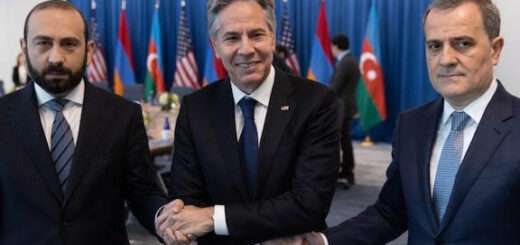A land dispute in the Old City of Jerusalem

Armenian activists in Jerusalem are outraged over an agreement to lease communal land to a hotel developer.
An imbroglio has emerged in Jerusalem over a nondescript 2.8-acre parcel of prime real estate known in Armenian as Goveroun Bardez (the Cows’ Garden). The Armenian patriarch, Archbishop Nourhan Manougian, has entered into an agreement with a company called Xana Gardens to build a luxury hotel with 69 to 75 suites on the community’s communal property. Purchased 700 years ago, the land was entrusted to the patriarchate as a perpetual endowment.
Armenian activists here and worldwide are up in arms over the lease agreement, which they see as fraudulent. They are suing Xana Gardens in both Israel and the United States.
The genesis of the deal dates back to 2020, when the Jerusalem municipality struck a ten-year usage agreement with the patriarchate. City Hall said it would pave the muddy field to improve parking for the neighborhood’s denizens and the residents of the nearby Jewish Quarter. The contract signed between the city and the patriarchate contained a clause whereby it would be void if, in the future, an agreement were to be signed to construct a hotel on the same site.
That’s precisely what happened in July 2021, when a 49-year lease with an option to double that term was signed between Manougian and Danny Rothman, aka Daniel Rubenstein, a Jewish Australian developer from Xana Gardens.
The uproar has been ongoing, leading to the defrocking of priest Baret Yeretsian, who was the director of the patriarchate’s real estate department and has since fled the country. Now even the patriarchate itself wants out of the lease deal with Xana Gardens.
Anti-lease activists like Hagop Djernazian, a fourth-generation descendant of Armenian genocide survivors, consider themselves to have been betrayed by the patriarch. They have formed a group called Save the ArQ. The nonprofit organization claims that Manougian and Yeretsian signed the lease under a veil of darkness and that the contract is illegal.
To understand this conflict and its implications, it is helpful to go back to the origins of the Armenian community in Jerusalem’s Old City and its unique position.
Located in the southwest quadrant of the roughly rectangular Old City, this ancient Armenian diaspora community’s home occupies 14 percent of the historic walled town—considerably less space than the Jewish, Christian, and Muslim sections. As Matthew Teller says in his groundbreaking 2022 book Nine Quarters of Jerusalem: A New Biography of the Old City, the concept of four quarters was arbitrarily imposed by British cartographers in 1841. In reality, Jews, Christians, and Muslims lived intermingled until the riots of 1929 and 1936. It was at that point that British Mandate constabulary, anxious to avoid getting caught in the middle of ethnic-religious tensions, separated the groups, in effect creating four quarters on the ground.
Arriving in Jerusalem as pilgrims 1,600 years ago, the Armenians’ ancestors established their patriarchate in 638. After the 1915 genocide of 1.5 million Armenians by Ottoman Turks and their Kurdish allies, a flood of 10,000 destitute refugees straggled in from Anatolia and the Syrian Desert and camped in the Cows’ Garden until permanent housing could be provided inside St. James Convent.
What remains in the Old City is a close-knit but shrinking Armenian hamoula (clan) of 1,500. This is the largest of the 13 Christian denominations in the city. Some 600 members of those extended Armenian families have moved out of the cramped Old City and into Israeli and Palestinian suburbs. Many Armenians here have accepted Israeli citizenship since 1967, when Israel captured East Jerusalem in the Six-Day War and then abolished its Jordanian municipality. Some hold passports from both Israel and Jordan.
These deep roots in this place and the story of refuge have led Djernazian and fellow Save the ArQ activists to envision a mixed development at the Cows’ Garden, one that benefits the entire community. Respecting the site’s architecture and archaeology, they seek to build a gated community blending housing, commerce, and open space atop underground parking. The group’s plan accords with municipal bylaws restricting the height of construction to preserve the postcard-perfect views of the Old City and its many synagogue domes, belfries, and minarets.
Save the ArQ aims to raise awareness of the Armenians’ centuries-long religious, cultural, and historical presence in the holy city. They want to revitalize their historic community, which includes the Crusader-era Cathedral of St. James; a seminary attracting students from across the Middle East, Europe, and America; the impressive Edward and Helen Mardigian Armenian Museum, which opened in 2022 in the 1843 Armenian Theological Seminary building; and the Calouste Gulbenkian Library, which was established in 1929 by the Turkish-born petroleum magnate and has since grown to more than 100,000 books, including thousands of rare manuscripts and incunabula.
While the books are priceless, the Cows’ Garden is also worth a pretty penny. Appraisers hired by Save the ArQ valued the former meadow at an eye-popping $27 to $39 billion. With that many shekels at hand, the rule is to follow the money. No one has been convicted of malfeasance—yet.
“It’s a catastrophic deal,” Djernazian told the CENTURY. It violates the patriarchate’s 2002 constitution restricting leaseholds to 25 years, he explained. Jordan and the Palestinian Authority concur. In 2023, both governments froze their recognition of the patriarchate in protest against the deal, which they claim will further Judaize the multiethnic, multifaith Old City.
Armenian Orthodox Patriarchate Road is the quarter’s single-lane thoroughfare. Buses, taxis, and residents possessing a pass for the electronic barrier drive into the Old City via the Jaffa Gate and exit at the Zion or Dung Gates. Vehicles squeeze under the arch near the patriarchate, pass by St. James Cathedral, and continue to the Jewish Quarter and the Western Wall. Parking is at a premium. The traffic jams are a holy mess.
Currently not much to look at, the Cows’ Garden includes a parking lot and an adjoining, chained-off empty plot. A hillock of bulldozed asphalt, on which the Armenian flag has been raised, symbolizes the tense standoff.
The lot strategically lies between the aforementioned street and the Old City’s honey-colored limestone walls, built between 1537 and 1541 by Ottoman caliph Suleiman the Magnificent. The lot is the largest land development site available in the dense and largely pedestrian-only Old City. To build the proposed hotel, several residential and commercial properties would be demolished. The leasehold also includes two handsome fin de siècle buildings on Jaffa Road—the new city’s main drag—opposite City Hall and its light-rail station.
Manougian has served as head of the Armenian Orthodox Patriarchate—also known as the Apostolic See of Saint James in Jerusalem—since 2013. His business partner, the developer Rothman, has a history of both financial and resume irregularities. On his LinkedIn profile, he claims to have received a bachelor’s degree from the London School of Economics. But the university told the New Arab news outlet that it has no record of a graduate named Danny Rothman (or Daniel Rubenstein).
Questions swirl around Rothman. Is the secular Jew a hotel developer? Or is he the frontman for religious settlers keen to buy real estate in the Armenian, Christian, and Muslim Quarters? His Xana Gardens is a subsidiary of Xana Capital Group, which is registered in Dubai. Company shareholder information in the United Arab Emirates is not readily available.
Xana is partnered with One&Only, a glitzy resort operator also based in Dubai. Their Jewish-Arab partnership emerged following the signing of the Abraham Accords in 2020. Their proposed luxury hotel is the fruit of the bilateral agreements on normalization signed between Israel and the UAE. When Hamas launched its murderous October 7 attack, it was hoping that the massacre would disrupt deals like this one and stop Saudi Arabia from further extending the sphere of Middle East agreements.
In the deal for the Cows’ Garden, the patriarch offered Xana Gardens and One&Only the leasehold—known as dmei mafteach (key money) in Hebrew—in exchange for paying the patriarchate the greater of either 5 percent of the hotel’s yearly profit or $300,000 per annum.
By the standards of Jerusalem’s rarefied luxury real estate shuq—where stratified prices compare to London, Hong Kong, or Manhattan—Xana Gardens and One&Only struck a shrewd deal. The site they acquired is nonpareil. Apart from the untouchable Temple Mount, the Cows’ Garden is the largest open plot within Jerusalem’s Ottoman ramparts.
While the Cows’ Garden has been the most controversial tract included in the deal, Manougian also signed away his own private garden and parking place. Djernazian, the activist, suggested that the patriarch may have been hoodwinked by Yeretsian, the former real estate director, since he seemed unaware of the deal’s details. The fact that Manougian took the unusual step of defrocking Yeretsian adds weight to this theory. Yeretsian has always insisted that everything he did was at the orders of the patriarch, whose signature legalized the controversial land deal.
Details of the 2021 contract between the Armenian patriarch and Xana Gardens were made public for the first time during the presentation in July 2023 of a fact-finding report by a team of international lawyers from the United States and Armenia. They disclosed photos of Rothman, Manougian, Yeretsian, and deputy archbishop Sevan Gharibian at the signing ceremony.
Djernazian said that Manougian was able to carry out the secret agreement and keep it hidden for two years thanks to the lingering impact of British imperialism from a century ago. When Britain captured Ottoman Palestine in 1917, it changed the status quo arrangements by which the various faith communities had governed themselves. The imposition of King George V’s divide-and-rule policy led to two lay positions being removed from the Armenian patriarch’s council, making the rule of the clerical troika inviolate. Among other demands, Save the ArQ wants those lay positions restored.
Meanwhile the protests have continued. In October, bulldozers demolished the wall between the parking lot and the remainder of the Cows’ Garden. Five days later community activists revealed that legal proceedings had been filed in the Jerusalem District Court to annul the sale. The next day the Armenian patriarchate issued a press release confirming that it had submitted documents requesting an annulment as well.
Then on November 5, around 3 p.m., a cavalcade of gun-toting Israeli settlers drove up to the Cows’ Garden, where 300 Armenian community activists had set up a protest tent. Xana’s Danny Rothman and George Warwar, accompanied by 15 hooligans with attack dogs, claimed that it was their land and demanded the Armenians leave. Warwar threatened the protesters that he would “get them one by one.” The settlers screamed abuse as well.
Israeli police arrested three Armenians in the subsequent scuffle. Further physical attacks on Armenian Quarter residents took place on November 15, December 28, January 3, and April 3. Currently, the patriarchate is suing Xana both in Israel and the United States, where Yeretsian is a citizen. In turn, Xana may countersue the patriarchate for breach of contract. The patriarchate’s lawyer, Daniel Seidemann, is founder and director of Terrestrial Jerusalem, an Israeli organization that promotes an Israeli-Palestinian peace agreement by working to ensure that an accord is possible on the issue of Jerusalem.
Djernazian noted that the unresolved status of the city’s Armenian Quarter was a key issue at the abortive Camp David Summit in 2000. The quarter has had a rich history, and its future could be promising. But with the Cows’ Garden embroiled in legal battles, the present looks tragically muddled—like so much else in Israel and Palestine. While the future of the Cows’ Garden is in dispute, the first rule of real estate—location, location, location—remains immutable.







